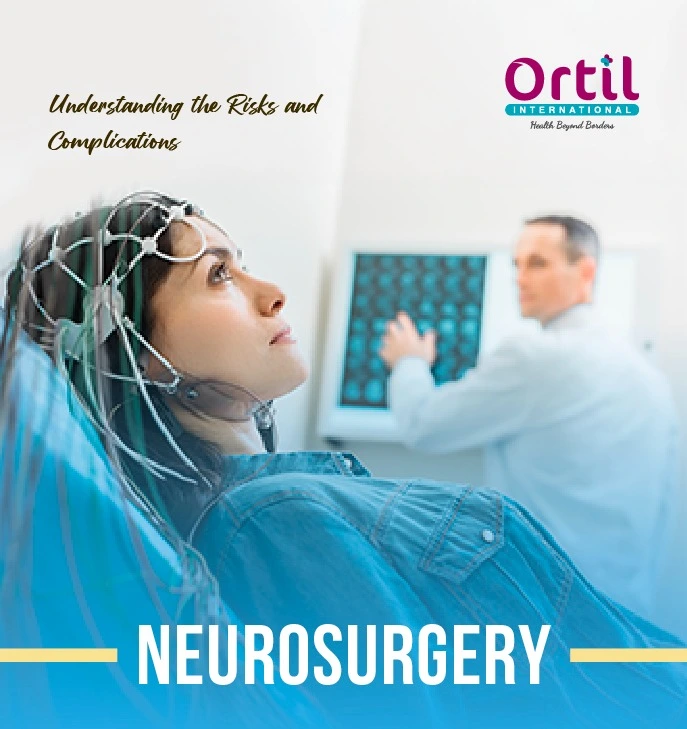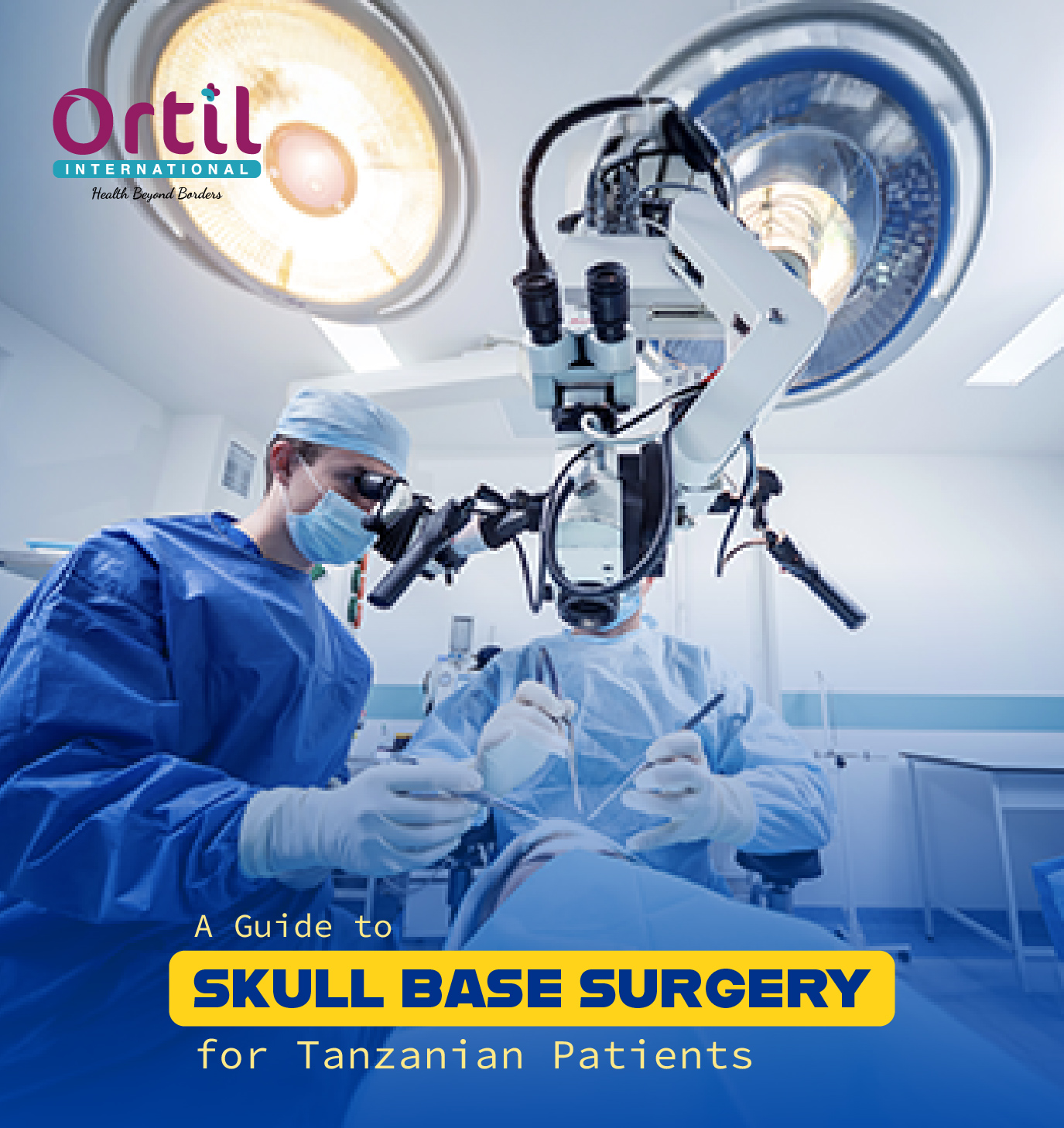What are the risks and complications of neurosurgery?
Neurosurgery is a treatment option for many conditions related to the brain, nervous system, and spine. Because of the sensitive nature of these structures, neurosurgery has many risks and chances of complications, such as bleeding infection, cognitive problems, and neurological deficits. Some of the neurosurgical procedures are more prone to cause complications than others.

Neurosurgery
Neurosurgery is a department that handles the diagnosis, treatment, and management of conditions related to the nervous system, including the brain, spinal cord, nerves, and spine. Both surgical and non-surgical treatments are included in this according to the disease or neurological injury.
Types of neurosurgical procedures
Neurosurgical procedures are performed on the brain and spine. Each neurosurgical procedure is performed according to the condition of each patient and the nature of the disease. Some of the neurosurgical procedures are as follows:
Neurosurgical Procedures Related to the Brain:
- Craniotomy
- Endonasal endoscopic surgery
- Aneurysm repair
- Tumor resection
- Deep brain stimulation (DBS)
- Gamma Knife radiosurgery
- Microvascular decompression
- Epilepsy surgery
- Chiari decompression
- Ventriculoperitoneal (VP) shunt
Neurosurgical Procedures Related to the Spine:
- Spinal fusion
- Laminectomy
- Discectomy
- Spinal tumor resection
- Vertebroplasty/Kyphoplasty
- Foraminotomy
- Spinal cord stimulation
- Spinal decompression surgery
- Artificial disc replacement
- Microdiscectomy
Risks and Complications in Neurosurgery
Some of the risks and complications related to Neurosurgery are as follows:
General Risks and Complications:
- Infection
- Bleeding
- Blood clots
- Anesthesia complications
- Pain
- Scarring
Neurological complications:
- Seizures
- Stroke
- Brain swelling
- Hemorrhage
- Cognitive impairment
- Memory loss
- Speech difficulties
- Motor function impairment
- Sensory deficits
- Nerve damage
- Neuropathic pain
- Paralysis
- Vision changes
- Hearing loss
- Balance and coordination issues
- Cerebrospinal fluid (CSF) leak
- Infection (e.g., meningitis)
- Hydrocephalus
Anesthetic complications:
- Allergic reactions
- Respiratory distress
- Hypotension (low blood pressure)
- Hypertension (high blood pressure)
- Arrhythmias (irregular heartbeats)
- Malignant hyperthermia
- Nausea and vomiting
- Aspiration
Preoperative Evaluation and Risk Assessment
Neurosurgery is a complicated and delicate procedure due to its involvement with sensitive structures such as the brain and spinal cord. Before performing neurosurgery, surgeons perform a comprehensive pre-operative evaluation of each patient. This evaluation is essential for identifying and assessing any potential risks or complications that may arise during the surgery.
To achieve this, doctors thoroughly review the patient's medical history and may also conduct a series of diagnostic tests after a detailed physical examination. The information from these assessments is helpful for the surgeon and medical team to effectively manage and minimize any complications that may occur during or after the neurosurgical procedure.
Complications in Specific Neurosurgical Procedures
Each neurosurgical procedure is unique and involves different structures, so it also has different types of complications. The procedures involve the brain, and the procedures involve the spine. Both have various distinct chances of complications, as described below:
Brain Surgery-Specific Risks and Complications:
- Seizures
- Stroke
- Brain swelling
- Memory or cognitive changes
- Speech difficulties
- Motor function impairment
- Cerebrospinal fluid (CSF) leak
Spine Surgery-Specific Risks and Complications:
- Nerve damage
- Paralysis
- Spinal fluid leak
- Hardware failure
- Chronic pain
- Pseudoarthrosis (failed fusion)
- Loss of spinal stability
How to Reduce Risks and Complications
Luckily, due to the availability of advanced technologies and the latest techniques, it is now possible to minimize the chances of risks and complications after neurosurgery. There are some strategies that can be followed to manage complications. These may include:
- Managing modifiable risk factors
- Use of the latest and advanced technologies
- Observation after neurosurgical procedure
- Rehabilitation
- Proper medications and follow-ups
Managing modifiable risk factors:
To reduce the chances of complications, the surgeons find out the modifiable risk factors through proper evaluation and prepare themselves to manage the conditions that can complicate the procedure or healing. These may involve managing chronic conditions, controlling blood pressure, adequate nutrition, and smoking cessation. These factors improve the overall health of the patient and reduce the chances of complications.
Use of the latest and advanced technologies:
Advancements in surgical techniques and technology have significantly improved outcomes in neurosurgery. Minimally invasive approaches, intraoperative imaging, and neuronavigation systems allow surgeons to perform procedures with greater accuracy and precision that minimize tissue damage and reduce the risk of complications.
Observation after neurosurgical procedure:
It is an integral part of surgery to keep the patient under observation after neurosurgery. Close monitoring is essential for the early detection of complications and timely intervention. This includes the close observation of vital signs, neurological status, and wound healing. Medications are also given for pain management and infection prevention.
Rehabilitation:
Rehabilitation is an essential part of neurosurgical care, especially for patients with neurological deficits. Physical therapy, occupational therapy, and speech therapy are customized according to the needs of each patient and to maximize their recovery.
Proper Medications and Follow-ups:
Medications and follow-ups are essential parts of recovery. Patients visit their doctors from time to time to detect any complications. This may help in speeding the recovery phase after neurosurgery.
Conclusion
Neurosurgery is a complicated procedure that possesses many risks and complications. However, these complications can be managed with pre-operative evaluation, history, choosing the most suitable method, and proper follow-ups. Each neurosurgical procedure is unique, and that’s why individualized treatment plans are necessary for positive outcomes.
FAQ's Of the risks and complications of neurosurgery
How Long Does it Take to Recover From Neurosurgery?
Each neurosurgical procedure is unique and may need a unique period for complete recovery. However, many patients recover in 8-12 weeks, while others may take more time.
Are There Any Alternative Treatments to Neurosurgery?
Alternative treatments for neurosurgery include radiation therapy, chemotherapy, and proton therapy. However, each treatment is used according to the patient’s condition.
What can I do to Prepare for Neurosurgery?
Following the instructions of the surgeon, making a healthy lifestyle, and engaging in proper assessment before surgery can be helpful in preparing for neurosurgery.
How Successful is Neurosurgery?
Neurosurgery is highly successful in improving the conditions of patients. Still, the success of neurosurgery depends on the general health of the patient, the type of procedure performed, and the surgeon's accuracy in performing the procedure.
How do I Find a Skilled Neurosurgeon?
Do your research on skilled neurosurgeons with experience and successful patient reviews. Consult with your doctor and understand your condition before choosing the neurosurgeon.
















 Treatment.jpg)
